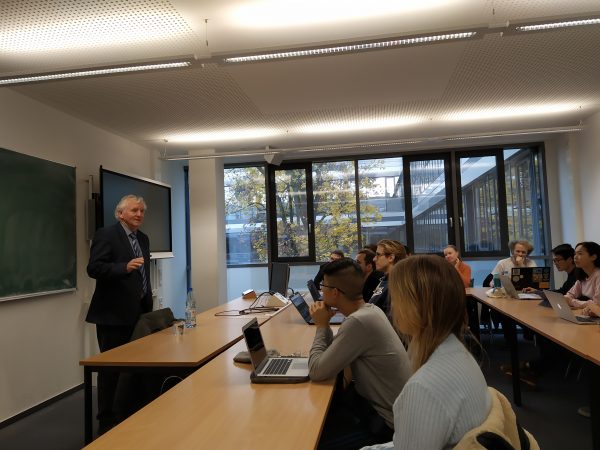I was delighted to represent the FMA at the Georg- August University in Gottingen recently to speak to the students who were participating in the Erasmus Mundus Master’s Programme “Euroculture-Society, politics and culture in a global context“. The theme of the conference was “The role of the European Parliament & Challenges to and of the European Union: The EU as an international actor”, “National Identity/Europeanness/Citizenship & BREXIT” and “EU Careers”. The University of Göttingen is an internationally renowned research university. Founded in 1737 it offers a comprehensive range of subjects across 13 faculties. With over 30,000 students and offering up to 212 degree courses, the University is one of the largest in Germany. Amongst its alumni are Gerhard Schroder former Chancellor of Germany and the new President of the European Commission Ursula Von der Lynn.
The Erasmus Mundus Master’s Programme “Euroculture – Society, politics and culture in a global context” partly financed by the European Commission is a transdisciplinary, international and inter-university project. Ever since the establishment of the Programme in 1999, Euroculture was used as a concept to reflect in an interdisciplinary way on the many different expressions and manifestations of self-understandings of societies, social groups and individuals of, about, within and beyond Europe.

My attendance at the lectures was over two days and the students being international led to an interesting debate on the various topics that were discussed. The first session concerned the challenges facing the European Union. I covered the usual challenges like Migration,
Ageing Europe, Climate Change and particularly the challenge for the European Institutions to connect with its citizens. As a former member of the Committee of the Regions I stressed the importance of the often quoted saying that all politics is local. The European Union
needs to get its message across to the ordinary citizens in a clear unambiguous manner.
We also discussed the challenge that Brexit has presented and the implications that the United Kingdom’s leaving the Union would have. As a former member of the European Parliament representing Ireland I reiterated that I regretted very much that the people of
the UK voted to leave the EU in the referendum of 2016. Again, I expressed that like the other
challenges the member states working together would be stronger as a unit than any one country on its own.
The second day concentrated on my own experience as a member of the European Parliament. I was delighted that the students had researched my political background and one student from Wales referred to my involvement in making the Irish language a working language of the EU. I spoke of my belief that Europe is united by its diversity and
my native Irish language was of great importance and a source of pride to me during my time as an MEP.
During this session a talk was given by Andreas Kumar, EU Careers Ambassador at the University on careers in the European Institutions. This was a comprehensive account
and the students took great interest in the information given. I would like to thank all the students who participated and the staff who organised the conference especially
Marc Arwed Ruthe, the coordinator of the Euroculture programme. My thanks also to Dr. Lars Klein, senior lecturer and Professor Simon Fink, Director of Studies.


